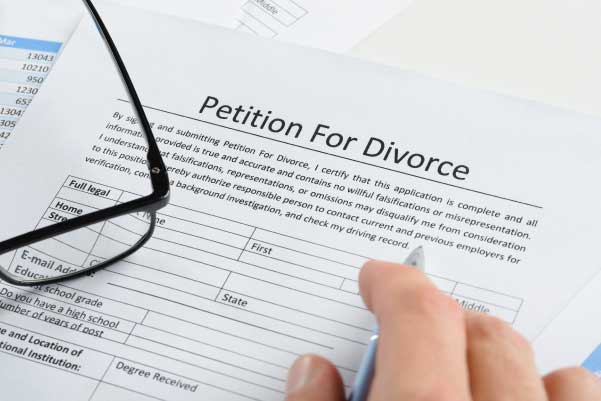** URGENT COVID-19 - WE'RE STILL OPEN *** Please click here for updates.
** COVID-19 - WE'RE STILL OPEN ***
Please click here for updates.
** URGENT COVID-19 - WE'RE STILL OPEN *** Please click here for updates.
** COVID-19 - WE'RE STILL OPEN ***
Please click here for updates.
 How Long Does a Divorce Take?
How Long Does a Divorce Take?One of the first questions that a client who is contemplating a divorce asks an attorney is, “How long does a divorce take?”
Unfortunately, it typically takes much longer to get out of a marriage than it does to get married unless you live in a state that has a simplified divorce proceeding and your divorce is uncontested.
The length of time that a divorce takes depends on several factors including...
The divorce process can be simple and quick or it can be long, complicated, and fraught with frustrating delays.
In Ohio, couples can end a marriage in one of four ways: legal separation, divorce, dissolution of marriage, and annulment. The length of time to obtain a final divorce will depend heavily on the type of divorce proceeding.
Therefore, if you are considering a divorce, you must seek the advice of an attorney in the state in which you reside to determine the specific state laws that govern divorce.
The main factor that determines how long a divorce takes is the parties themselves.
If the parties can communicate effectively to resolve the issues of the divorce, the necessity of a lengthy litigation process is avoided.
The length of the divorce process will be determined by how quickly the parties move through each step in the divorce process, the laws of that particular state, and how quickly the case can move through the court system. In some states, this could result in a divorce timeline as short as a couple of months or up to one year depending on state law.
The basic steps for filing for an uncontested divorce are:
Though people sometimes confuse the two, an uncontested divorce is not the same as a dissolution. Dissolution is not a divorce. It's a mutual agreement between both spouses spelling out how they would like to dissolve their marriage.
An uncontested divorce happens when once a spouse files for divorce and the other spouse fails to respond within 42 days. At that point, the judge will grant the divorce to the spouse who filed. Often "as is," but sometimes with some modifications to the original filing.
Working with an experienced divorce attorney can also help to expedite an uncontested divorce. An attorney who handles divorces regularly understands the divorce laws and process in Ohio.
The attorney is also familiar with the court staff and judges, which can help move the case along faster as opposed to an attorney who is unfamiliar with how the court in your specific county operates.
In a contested divorce where the parties are arguing over issues such as grounds for divorce, child custody, child support, alimony, property division, and other issues, the length of time to complete the divorce process substantially increases.
In a complex, highly-contested divorce, the parties could spend a year or even two years battling each other in court. It is not unheard of for a contested divorce to take three or more years to make its way through the litigation process and the court system.
While each divorce case is different, there are basic steps in the divorce process that are common regardless of where the parties file for divorce.
 The divorce process begins with one party (the plaintiff) filing a complaint or petition with the court. A complaint generally has three sections.
The divorce process begins with one party (the plaintiff) filing a complaint or petition with the court. A complaint generally has three sections.
The first section identifies the parties, establishes that the court has jurisdiction over the subject matter, and states whether the parties have any minor children.
The second section sets forth the allegations for the divorce such as marital misconduct or other grounds according to state law. It also argues why the petitioning party should be granted certain relief such as custody, child support, alimony, and certain property.
The third section summaries the relief being sought and requests that the court grants the relief.
In most cases, the complaint or petition asks for much more than the party may be willing to accept because it is designed to seek the maximum relief possible as a beginning point in the litigation process.
After the complaint or petition is filed with the court, it must be served on the opposing party (the defendant). Each state has laws that specify how the summons and complaint must be served on the defendant.
Some states allow for service by mail while other states require that the defendant be personally served. Once the service of the complaint is complete, the attorney files an affidavit with the court stating the exact date the defendant was served. This sets a deadline for the defendant to file a responsive pleading with the court.
In most states, a defendant has up to 30 days to file an answer, counterclaim, or another responsive pleading with the court. An answer and counterclaim is simply the defendant’s response to the allegations made by the plaintiff in the complaint.
If the defendant does not file an answer within the time allotted by law, he or she is considered to be in default. The plaintiff can then request a default hearing and ask the court to grant the relief requested in the complaint.
However, in a contested divorce, the defendant will likely file an answer denying the allegations made by the plaintiff and counterclaim with his or her allegations. The counterclaim will state the reasons why the defendant denies the plaintiff’s allegations and set for the relief that the defendant believes he or she is entitled to receive.
In some cases, a temporary hearing may be necessary to decide issues that cannot wait until a final hearing is held. If a temporary hearing is required, the party must file a motion with the court stating the reason for the temporary hearing.
Most temporary hearings deal with issues such as custody, child support, alimony, temporary possession of the marital home or other assets, protective orders, and injunctive relief.
The relief granted at a temporary hearing may or may not be the same relief granted in a final hearing. Furthermore, the relief granted at a temporary hearing may be changed if there is sufficient evidence of a substantial change in circumstances that would warrant a new order.
In some contested divorces, mediation is an effective means of resolving differences and speeding up the divorce process. Some states require parties to participate in at least one mediation session before a hearing will be scheduled.
 In some contested divorces, mediation is an effective means of resolving differences and speeding up the divorce process. Some states require parties to participate in at least one mediation session before a hearing will be scheduled.
In some contested divorces, mediation is an effective means of resolving differences and speeding up the divorce process. Some states require parties to participate in at least one mediation session before a hearing will be scheduled.
An objective third-party mediator facilitates discussions between the parties in the hope of finding an amicable resolution to the contested issues.
The mediator is a neutral party and does not offer advice nor advocate for either party.
Most mediation sessions are confidential and the matters discussed in mediation are not admissible in court.
This encourages the parties to communicate openly and honestly in an attempt to find an agreeable resolution to their issues. If mediation fails, the divorce process proceeds to the discovery phase.
During the discovery phase, each party “investigates” the other party by using several legal procedures to gain additional information and documentation to support the party’s allegations.
In a contested divorce, discovery is used to gain evidence that will be presented at trial to support the party’s position. Depending on the case and the issues involved, the discovery process could take several months to over a year to complete.
Examples of discovery include:
In some cases, a party may not respond to discovery or provide responses that are not complete. If the attorneys cannot resolve the issue, the requesting party must file a motion for a hearing to compel the other party to respond to the discovery requests.
This is another step that often causes the divorce process to be longer as the parties argue over discovery matters.
Depending on the issues of the divorce, expert witnesses may be required to provide testimony on behalf of the parties.
Experts may testify at trial in contested custody matters, to evaluate a business or an asset, to provide the appraisal value of certain assets, provide information on the physical or mental capacity of one of the parties, and provide information that supports allegations of marital misconduct (i.e. a doctor testifying about physical abuse).
Locating and retaining expert witnesses can be time-consuming and costly. In most cases, the opposing party will depose the expert witness to determine what the expert will testify to at the trial.
The parties may choose to resolve or settle the case at any time before trial. In many cases, a settlement offer is made after the discovery phase when both parties have gathered more information and evidence related to the facts of the case.
Some states require settlement conferences where the judge meets with the attorneys and the parties to discuss the issues of the case to determine if a settlement can be reached without the necessity of a trial.
If the parties cannot agree on a settlement, the case is scheduled for a trial.
If the parties cannot settle their issues through mediation or at a settlement conference, the case is set for trial.
A trial can last less than a day or several days depending on the issues involved, the number of witnesses and the evidence to be presented.
 Each party will be given the opportunity to testify on his or her behalf as well as call witnesses to testify to support the party’s allegations. The plaintiff presents his or her case first followed by the defendant.
Each party will be given the opportunity to testify on his or her behalf as well as call witnesses to testify to support the party’s allegations. The plaintiff presents his or her case first followed by the defendant.
Each witness that is called is examined by the party who called the witness to testify. The opposing party then has the opportunity to cross-examine the witness to ask follow-up questions.
Once all of the evidence is presented, the judge will make a final ruling.
Often, the judge will take the case “under advisement” meaning that the judge will take time to consider the evidence presented before making a final ruling. This could take an additional week or more. When the judge issues his or her final ruling, an order is prepared and filed with the court.
Each party receives a filed copy of the order.
A divorce case is not final upon the judge’s order. Either party may appeal the judge’s order if he or she feels there are sufficient legal grounds to overturn the judge’s ruling.
An appeal could take several years to complete depending on the complexity of the case and the issues at hand.
As you can see, there is not a simple answer to the question, “How long does a divorce take?”
Many factors and elements are involved making it virtually impossible to answer that question without knowing the facts related to the divorce case.
However, an experienced divorce attorney can typically give you an idea of how long your divorce will take based on your situation. You should always consult with an experienced divorce attorney before making any decisions about your divorce.
Some actions may cause the divorce process to be longer; therefore, it is in your best interest to seek the advice of an attorney before taking any actions if you are contemplating a divorce.
There will be some things that you cannot control in your divorce case. For example, mandatory waiting periods prescribed by state law or the court’s schedule. However, there are several ways that you can take control of the divorce process to speed up your divorce.
Because the laws of each state vary about the divorce process, there could be ways to speed up the divorce process within the divorce laws of your particular state.
When you meet with your divorce attorney, be honest about your desire to speed up the divorce process and ask the attorney about any provisions within state law that would allow you to obtain a divorce faster.
However, you should also discuss with your attorney any potential negative consequences that you could potentially face if you try to speed up the divorce process.
In some cases, it may be in your best interest to allow the divorce process to take as long as it will take to protect yourself and your children. Only you and your attorney can make this decision based on your specific circumstances and the applicable state divorce laws.
Take the guesswork out of divorce fees. Click here to learn more.
Jack’s Law Office
305 S Sandusky St
Delaware, OH 43015
(740) 369-7567